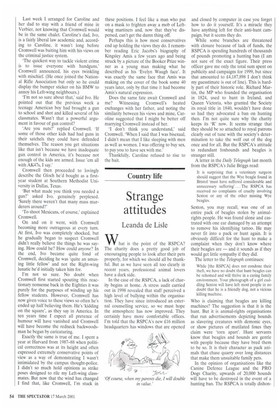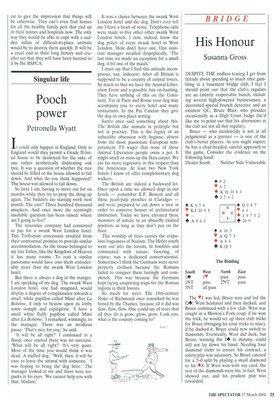Strange attitudes
Leanda de Lisle
What is the point of the RSPCA? The charity does a pretty good job of encouraging people to look after their pets properly, for which we should all be thankful. But as we have seen all too clearly in recent years, professional animal lovers have a dark side.
In the case of the RSPCA, a lack of charity begins at home. A stress audit carried out in 1998 revealed that staff perceived a high level of bullying within the organisation. They have since introduced an external counselling service, so we must hope the atmosphere has now improved. They certainly have more comfortable offices. I'm told that the RSPCA's new £16 million headquarters has windows that are opened and closed by computer in case you forget how to do it yourself. It's a miracle they have anything left for their anti-hunt campaign, but it seems they do.
While some branches are threatened with closure because of lack of funds, the RSPCA is spending hundreds of thousands of pounds promoting a hunting ban (I am not sure of the exact figure. Their press officer gave me only the total sum spent on publicity and campaigns for 1999, but since that amounted to £4,187,898 I don't think my guesstimate is out of line). This is hardly part of their historic role. Richard Martin, the MP who founded the organisation in 1824, used to hunt in Ireland, and Queen Victoria, who granted the Society its royal title in 1840, wouldn't have done so had they advocated a ban on hunting then. I'm not quite sure why the charity keeps its 'R' now. It seems strange that they should be so attached to royal patrons clearly out of tune with the society's determination to take the wolf out of the dog once and for all. But the RSPCA's attitude to redundant foxhounds and beagles is stranger still.
A letter in the Daily Telegraph last month from the RSPCA's Julie Briggs read:
It is surprising that a veterinary surgeon should suggest that the Wye beagle found in Bristol 'must have suffered considerable and unnecessary suffering' ... The RSPCA has received no complaints of cruelty involving Sexton or any of the other missing Wye beagles.
Sexton, you may recall, was one of an entire pack of beagles stolen by animalrights people. He was found alone and castrated with one ear damaged by an attempt to remove his identifying tattoo. He may never fit into a pack or hunt again. It is obviously difficult for the hunt to make a complaint when they don't know where their beagles are — and it sounds as if they would get little sympathy if they did.
The letter to the Telegraph continues:
While [the RSPCA] does not condone their theft, we have no doubt that hunt beagles can be rehomed and will thrive in a caring family environment. Your photograph of a girl cuddling Sexton will have left most people in no doubt that he is a friendly dog, not a vicious killing machine.
Who is claiming that beagles are killing machines? The suggestion is that it is the hunt. But it is animal-rights organisations that run advertisements depicting hounds as slavering creatures with demonic eyes, or show pictures of mutilated foxes they claim were 'torn apart'. Hunt servants know that beagles and hounds are gentle with people because they have bred them to be so. It is their character as pack animals that chase quarry over long distances that make them unsuitable family pets.
In the opinion of organisations like the Canine Defence League and the PRO Dogs Charity, upwards of 20,000 hounds will have to be destroyed in the event of a hunting ban. The RSPCA is totally dishon est to give the impression that things will be otherwise. They can't even find homes for all the healthy family pets that end up in their homes and hospitals now. The only way they would be able to cope with a sudden influx of difficult-to-place animals would be to destroy them quickly. It will be a cruel end to their long history and crueller yet that they will have been hurried to it by the RSPCA.



































































 Previous page
Previous page